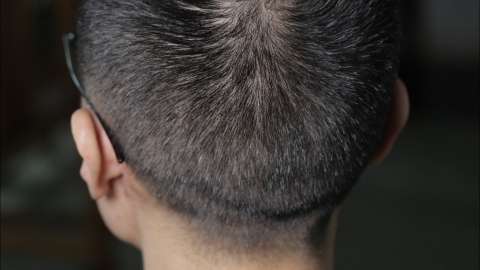What causes pain at the back of the head after sleeping?
Generally, a headache at the back of the head after sleeping may be caused by improper sleeping posture, cold exposure, migraine, occipital neuralgia, cervical spondylosis, or other reasons. Symptomatic management such as general treatment and medication may be needed. If discomfort occurs, it is recommended to seek medical advice promptly and undergo corresponding treatments under a doctor's guidance. Detailed analysis is as follows:

1. Improper Sleeping Posture
If the pillow is too high, too low, or too hard, or if the neck remains suspended during sleep, it may cause tension in the neck muscles, leading to pain at the back of the head, possibly accompanied by symptoms such as neck stiffness and dizziness. It is recommended to massage or apply heat to the affected area to relax the muscles and alleviate symptoms.
2. Cold Exposure
In cold indoor environments during winter or when the neck is directly exposed to air conditioning in summer, the cold may stimulate the neck nerves and muscles, causing tension and pain, possibly accompanied by symptoms such as dizziness and nausea. It is recommended to keep the neck warm during sleep and avoid cold environments.
3. Migraine
Migraine may be caused by genetic factors or endocrine and metabolic abnormalities. If you suffer from migraines and stay up late or get chilled at night, it may trigger a migraine attack in the morning, causing pain at the back of the head upon waking. Symptoms may be accompanied by nausea and vomiting. It is recommended to follow medical advice and use medications such as Nimodipine Tablets, Compound Propranolol and Caffeine Tablets, or Topiramate Tablets to relieve symptoms.
4. Occipital Neuralgia
If you maintain an improper sleeping posture for a long time or are exposed to cold during sleep, these factors may irritate the nerves and trigger occipital neuralgia, which may cause pain at the back of the head upon waking. The pain is often described as stabbing or tearing. It is recommended to use medications such as Ibuprofen Sustained-release Capsules, Carbamazepine Tablets, or Diclofenac Sodium Sustained-release Tablets under a doctor's guidance for treatment.
5. Cervical Spondylosis
Improper sleeping positions or excessive neck movement may lead to cervical spondylosis. In such cases, herniated discs or bone spurs may compress nerve roots or the spinal cord, causing pain in the neck and head, which is more noticeable when waking up during sleep. It may also be accompanied by limited neck movement, numbness, and weakness in the arms. It is recommended to follow medical advice and use medications such as Chlorzoxazone Tablets, Eperisone Hydrochloride Tablets, or Naproxen Sodium Tablets to relieve symptoms.
In daily life, it is recommended to exercise your neck regularly and perform neck stretching exercises, such as lateral bending and forward and backward flexion, which can help alleviate discomfort.




